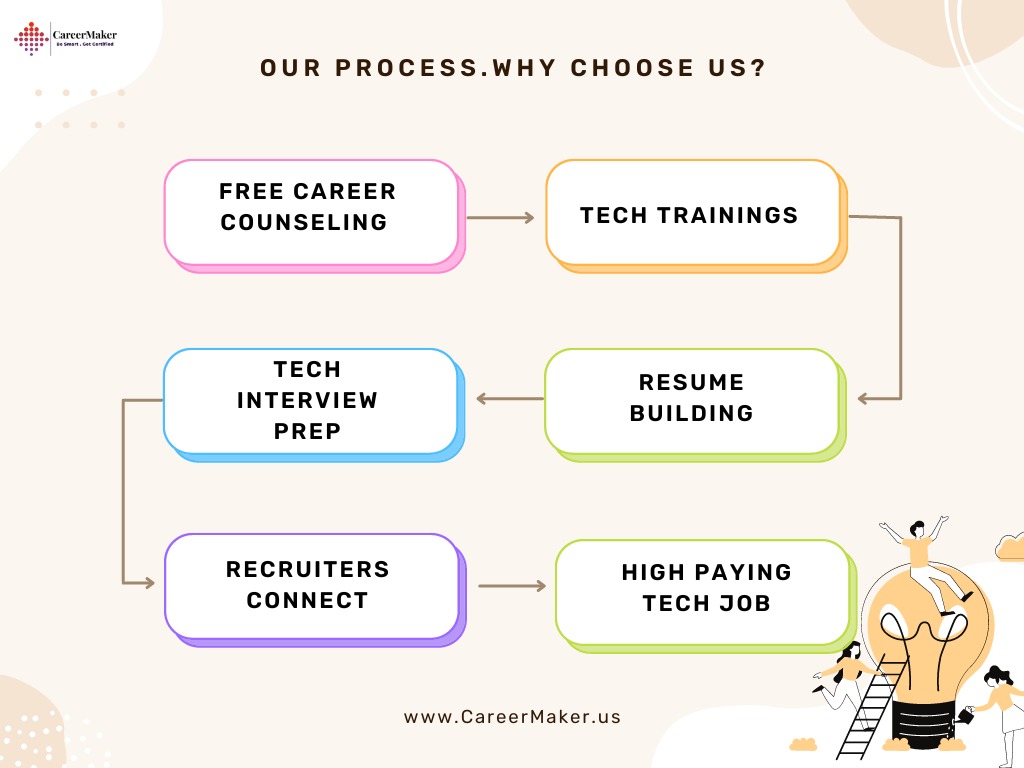Security Operations Center (SOC) Training Certification Kentucky | CareerMaker Solutions
Unlock your career potential with CareerMaker Solutions’ SOC Analyst Training in Kentucky. Our SOC Certification Kentucky program offers practical knowledge and hands-on experience in threat detection, incident response, and cybersecurity management. Designed for both beginners and experienced professionals, our training equips you with the essential skills needed to excel in today’s evolving security landscape. With expert-led courses and real-world scenarios, you’ll gain the expertise necessary to protect critical digital assets. Enroll today and take the next step in advancing your cybersecurity career in Kentucky!
Years in IT training industry
IT professional Trained
Countries
Bootcamps
- TRUSTED BY -










- SOC COURSE HIGHLIGHTS -

SOC Certification Training Highlights with CareerMaker:
Comprehensive Curriculum: Our SOC (Security Operations Center) certification training provides an up-to-date curriculum that covers key areas such as threat detection, incident response, security monitoring, and more. This ensures you’re well-prepared to tackle real-world cybersecurity challenges.
Hands-on Experience: Gain practical skills through real-world simulations and hands-on labs. You’ll learn how to manage and mitigate security threats effectively in diverse environments.
Expert Instructors: Learn from experienced cybersecurity professionals with extensive SOC expertise. Their insights and practical guidance will help you succeed in your career and gain a deep understanding of SOC operations.
Flexible Learning Options: Choose from online, in-person, or hybrid learning formats to fit your schedule and learning style. This flexibility makes it easier for you to balance training with your lifestyle.
Career Support: Benefit from career guidance, resume-building workshops, and job placement assistance to accelerate your journey toward a successful career in cybersecurity.
Industry-Recognized Certification: Earn a SOC certification that is recognized by leading organizations in the cybersecurity field, enhancing your professional credibility and opening doors to new job opportunities.
Networking Opportunities: Connect with peers, mentors, and industry experts through our platform to expand your professional network and build strong connections in the cybersecurity community.
- Upcoming Live BOOTCAMP CALENDAR -
Class Schedule
| 08:00 AM-10:00 AM(EST) | Weekend Evening | October 26 2024 - November 24 2024 | Live Online | $1200 STUDY NOW PAY LATER | INQUIRY NOW |
| 05:00 PM-08:00 PM(CST) | Weekend Evening | October 26 2024 - November 24 2024 | Live Online | $1200 STUDY NOW PAY LATER | INQUIRY NOW |
| 10:00 AM to 06:00PM(CST) | Weekdays | October 07 2024- November 02 2024 | Live Online | $1200 STUDY NOW PAY LATER | INQUIRY NOW |
October 26 2024 To November 24 2024
October 26 2024 To November 24 2024
October 07 2024 To November 02 2024
-Security Operation Center Training Program -
A Security Operations Center (SOC) is a specialized team within an organization responsible for monitoring, detecting, and responding to security threats in real-time. Operating at both technical and operational levels, the SOC ensures continuous surveillance of systems, networks, and data to identify potential risks and incidents. Its main objective is to protect the organization's digital assets by proactively defending against cyberattacks, breaches, and other security threats, ensuring that critical infrastructure remains secure and operational. By handling these tasks, the SOC helps to minimize the impact of security incidents and maintain a robust security posture.
The Security Operations Center (SOC) plays a crucial role in protecting an organization’s digital assets through a range of proactive security functions:
Continuous Monitoring: The SOC team provides round-the-clock monitoring of systems, networks, and applications to detect suspicious activity or potential threats in real-time, ensuring rapid identification of any security issues.
Incident Detection and Response: Upon identifying a security incident, the SOC team responds immediately to contain the threat, mitigate its impact, and prevent further damage to the organization’s infrastructure or reputation.
Utilizing Threat Intelligence: The SOC integrates both internal and external threat intelligence, which helps anticipate emerging risks and implement proactive defense strategies, allowing the organization to stay ahead of evolving cyber threats.
Vulnerability Management: The SOC is responsible for identifying vulnerabilities within systems, prioritizing them based on risk, and taking corrective actions to remediate weaknesses before they can be exploited by cyber attackers.
Compliance Management: By ensuring adherence to industry regulations and security standards, the SOC helps mitigate compliance-related risks and ensures the organization remains in good standing with clients, regulators, and stakeholders.
Cyber threats come in various forms, each with its own set of risks and consequences. Some of the most common types of cyber threats include:
Malware: Malicious software created to damage, disrupt, or gain unauthorized access to systems. This category includes:
- Viruses: Programs that attach themselves to files and spread to other systems when the infected file is executed.
- Worms: Self-replicating programs that spread across networks, often causing widespread damage.
- Spyware: Software that secretly gathers user information without consent, often for malicious purposes.
Phishing Attacks: Fraudulent attempts by cybercriminals to deceive individuals into revealing sensitive information such as login credentials, personal details, or financial information. These are typically carried out through emails, fake websites, or phone calls that impersonate legitimate organizations.
The SOC utilizes a variety of tools to effectively detect and respond to potential threats, including:
Intrusion Detection Systems (IDS): These tools monitor network traffic for suspicious activity and known threats, alerting the SOC team to potential breaches.
Security Information and Event Management (SIEM) Systems: SIEM platforms collect and analyze security data from across the network in real-time, enabling the SOC to identify, track, and respond to incidents quickly.
Threat Intelligence Platforms: These systems provide up-to-date information on emerging threats, vulnerabilities, and attack patterns, helping the SOC to proactively defend against attacks.
Together, these tools enable SOC teams to identify and respond to security incidents effectively, ensuring robust protection against cyber threats.
When a breach occurs, a Security Operations Center (SOC) follows a structured process to manage and mitigate the impact:
Identification: The SOC identifies the breach by analyzing security alerts, logs, and threat intelligence to understand the nature and scope of the incident.
Containment: To prevent further damage, the SOC isolates the affected systems or network segments, limiting the spread of the attack.
Eradication: Once contained, the SOC works to eliminate the root cause of the breach, which may involve removing malware, closing vulnerabilities, or fixing compromised systems.
Recovery: The final step involves restoring the affected systems and data to normal operation, while monitoring for any signs of re-infection or recurrence.
This methodical approach ensures that the breach is managed efficiently, minimizing damage and restoring normalcy as quickly as possible.
Request for More Information
-SOC Certification Syllabus -
Introduction to Security Operations Centers (SOC)
- Overview of SOC functions and structure
- Importance of SOC in cybersecurity
Security Frameworks and Compliance
- Understanding regulatory requirements (e.g., GDPR, HIPAA)
- Compliance frameworks and best practices
Threat Detection and Analysis
- Types of cyber threats and attack vectors
- Anomaly detection techniques
- Using threat intelligence to enhance security
Incident Response Process
- Incident response planning and preparation
- Steps in the incident response lifecycle
- Tools and methodologies for effective response
Security Monitoring and Logging
- Setting up monitoring systems and alerts
- Log management and analysis
- Use of Security Information and Event Management (SIEM) systems
Vulnerability Management
- Identifying and assessing vulnerabilities
- Tools for vulnerability scanning
- Remediation strategies
Hands-on Labs and Simulations
- Real-world simulations of security incidents
- Practical exercises in threat detection and response
Emerging Threats and Trends
- Analysis of recent cyber threats and trends
- Future challenges in cybersecurity
Career Development in SOC
- Building a career in cybersecurity
- Resume building and interview preparation
- Networking and professional development opportunities
Capstone Project
- Final project integrating all learned concepts
- Presentation and evaluation of the project
-SOC Certification Job & Salary -

Common tools utilized in a Security Operations Center (SOC) include Security Information and Event Management (SIEM) systems, Intrusion Detection/Prevention Systems (IDS/IPS), firewalls, Endpoint Detection and Response (EDR) systems, and network monitoring tools. These tools work together to detect, analyze, and respond to security threats, ensuring a proactive defense against cyber attacks.
A Security Information and Event Management (SIEM) system collects and analyzes security data from multiple sources in real-time. It helps the SOC quickly identify and respond to potential security incidents by providing comprehensive visibility into an organization’s security posture and enabling faster threat detection and response.
Threat intelligence is the process of collecting and analyzing information about existing and potential cyber threats. This valuable data helps organizations understand the threat landscape, allowing them to take proactive defense measures to prevent or mitigate cyberattacks before they cause damage.
Threat intelligence enhances Security Operations Center (SOC) operations by informing key processes such as threat detection, incident response, and vulnerability management. By providing actionable insights into current and emerging threats, it helps SOC teams proactively identify potential risks, respond more effectively to incidents, and address vulnerabilities before they can be exploited.
Vulnerability management is the process of identifying, assessing, and mitigating weaknesses within an organization’s IT infrastructure. It involves continuous monitoring for vulnerabilities, evaluating their severity, and implementing strategies to fix or reduce risks. By addressing vulnerabilities, a SOC helps prevent potential attacks and strengthens the overall security posture of the organization.
Compliance ensures that an organization adheres to industry standards and regulations, helping avoid legal penalties and maintain customer trust. In the context of a Security Operations Center (SOC), compliance involves implementing security measures that align with frameworks such as GDPR, HIPAA, and others, ensuring that sensitive data is protected and the organization operates within legal and regulatory boundaries. This commitment to compliance strengthens the organization's security posture and fosters confidence with stakeholders.
SOCs generate a variety of reports to provide valuable insights into security operations. These reports include:
- Incident Reports: Documenting details of security incidents, including the nature of the breach, its impact, the response, and the resolution steps.
- Compliance Reports: Ensuring adherence to regulatory requirements and industry standards, detailing how the organization meets security mandates.
- Threat Analysis Reports: Analyzing and identifying emerging threats, attack vectors, and potential risks, helping to strengthen future defense strategies.
- Executive Summaries: Offering high-level insights into the security posture of the organization, highlighting key incidents, vulnerabilities, and mitigation efforts for senior management.
These reports are essential for continuous monitoring, decision-making, and improving security practices within the organization.
Best practices for SOCs to ensure effective operations and enhance cybersecurity capabilities include:
Regular Staff Training: Continuously educate SOC personnel on the latest security trends, tools, and attack methods to ensure they stay ahead of evolving threats.
Automated Monitoring Tools: Leverage automation to streamline threat detection and incident response, improving efficiency and reducing the time it takes to address security issues.
Up-to-Date Threat Intelligence: Regularly update threat intelligence feeds to ensure the SOC is aware of emerging risks and vulnerabilities, allowing for proactive defense measures.
Routine Security Audits: Conduct frequent security audits and assessments to identify weaknesses, evaluate the effectiveness of current security measures, and ensure compliance with regulations.
By adhering to these practices, SOCs can maintain a strong defense against cyber threats and improve overall security posture.
Integrating Advanced Analytics: Leverage data analytics, machine learning, and artificial intelligence to identify patterns, detect anomalies, and predict potential threats more accurately and quickly.
Adopting Automation: Automate routine tasks, such as threat detection, incident response, and log analysis, to free up SOC analysts to focus on more complex and critical issues, thus increasing overall efficiency.
Promoting a Strong Security Culture: Foster a security-conscious culture within the organization by providing continuous training, encouraging collaboration, and raising awareness about security best practices across all departments.
Continuously Updating Processes and Tools: Regularly review and update SOC processes, tools, and technologies to adapt to evolving threats, improve response times, and enhance the ability to detect and mitigate emerging risks.
- Benefits Of Choosing CareerMaker Solutions ? -

- Our World-Class CERTIFIED INSTRUCTIOR
As a SOC Analyst at Specialty Solutions, I apply my expertise in cyber threat hunting (CTH) and Splunk Enterprise Security (ES) to monitor, detect, and respond to cyber incidents. I work with a team of cybersecurity professionals to protect the company's network and systems from malicious actors and ensure compliance with industry standards and regulations. I have multiple years of experience in the cybersecurity field, having previously worked as a Security Engineer at SecureTech, where I developed and implemented security solutions and policies. I have also acquired multiple certifications and skills in CTH, Splunk ES, and cybersecurity incident response, which enable me to perform my role effectively and efficiently. I am passionate about cybersecurity and always eager to learn new technologies and techniques to enhance my knowledge and skills
Nim Fon Queenette.
SOC Instructor- Certification Of Course Completion -

- Success Stories -
ARE YOU READY TO TAKE YOUR CYBER SECURITY CAREER TO THE NEXT LEVEL -
Don’t miss the opportunity to advance your cybersecurity career with our comprehensive Security Operation Center certification training. Enroll today and gain the essential skills and knowledge needed to protect organizations from the ever-growing landscape of cyber threats.
Contact us now to discover more about our training program, course schedules, and enrollment options. Start your path to a rewarding career in cybersecurity today!

- FAQ -
This program is ideal for:
Aspiring SOC Analysts: Individuals looking to start a career in cybersecurity operations will gain a solid foundation in SOC methodologies, tools, and techniques.
Cybersecurity Professionals: Those looking to enhance their existing skills and advance their careers can refine their knowledge in areas like threat detection, security automation, and incident response.
Individuals Focused on SOC Mastery: Anyone interested in mastering the critical techniques, tools, and methodologies required to succeed in modern Security Operations Center (SOC) environments will benefit from this advanced training.
The program provides the comprehensive expertise needed to thrive in the dynamic and fast-evolving field of cybersecurity.
Participants will engage in real-world scenarios, including simulated cyberattacks and incident response exercises, to apply their skills in a practical setting. Additionally, they will develop Python scripts to automate SOC tasks and analyze security data, honing their hands-on skills crucial for effective SOC operations and improving overall security management.
The program combines theoretical knowledge with practical exercises, allowing you to apply learned concepts to real-world scenarios. You will gain hands-on experience with industry-standard tools and technologies, preparing you to address and mitigate complex cybersecurity threats in a professional environment.
Yes, upon successful completion of the program, you will receive a Master SOC Analyst certification, which validates your advanced skills and expertise in Security Operations Center (SOC) operations. This certification highlights your proficiency in key areas like threat detection, incident response, security automation, and the use of industry-standard tools, making you a highly valuable asset to potential employers in the cybersecurity field. It serves as a significant credential, boosting your professional credibility and enhancing your career prospects in the competitive cybersecurity landscape.
While prior experience in cybersecurity or programming is beneficial, it is not a requirement for enrolling in the Master SOC Analyst Training Program. The program is designed to accommodate both beginners and experienced professionals, offering a comprehensive foundation for individuals new to the field, as well as advanced knowledge and techniques for those seeking to refine and expand their existing skills. Whether you're just starting your career or looking to enhance your expertise, this program will provide the tools and insights necessary for success in SOC roles.
You will develop expertise in using industry-standard tools such as Security Information and Event Management (SIEM) systems, Intrusion Detection Systems (IDS), and Endpoint Detection and Response (EDR) platforms, while also mastering Python programming to automate security tasks and enhance threat detection.
The Master SOC Analyst Training Program equips you with the advanced skills and certification necessary to distinguish yourself in the highly competitive cybersecurity job market. By mastering Python programming for security automation and gaining hands-on experience with essential tools such as SIEM systems and threat detection platforms, you’ll be fully prepared to excel in high-level SOC roles. This comprehensive training will enable you to effectively manage cybersecurity operations and significantly accelerate your career in the dynamic field of cybersecurity.


